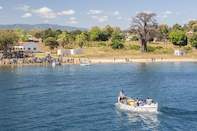
The first Malawians to leave traces of their lives were knappers of sturdy stone axes and scrapers some 100,000 years ago. From the 3rd Century AD modern African peoples settled in villages on the shores of Lake Malawi.
The Chewa founded the important Maravi empire at the southern end of the Lake in the 16th Century, trading with the Portuguese on the coast, while the Yao built an empire around the area of Blantyre and Zomba. In the 19th Century the Ngoni, relatives of the Zulus, swept up into Malawi and soon settled in the area. The Swahili set up on the shores of the Lake, establishing links as far north as Zanzibar.
The course of Malawian history changed when Scottish explorer David Livingstone, thwarted by the Cahora Bassa rapids on the Zambezi river, turned his small steamer north up a tributary, the Shire river, towards the great lake he had heard report of. Greatly impressed by Lake Malawi, he returned two years later to what he called `the Lake of Stars'.
There was sporadic settlement by other British missionaries and settlers from the 1860s. Britain installed a consul in 1884 to look after the interests of her citizens. The present borders were drawn up as the British Protectorate of Nyasaland in 1891.
Malawi Gains Independence
The country gained independence in 1964 and became a Republic within the Commonwealth. In 1994, Malawi became a multiparty democracy under the present President, Dr. Bakili Muluzi, who is serving his second term in office. The next general elections are scheduled for June 2004.
The new constitution guarantees freedom of speech, religion and assembly. Malawi's civil administration is committed to the principles of good governance, transparency and accountability.
The government encourages investment and is looking to the private sector to assume the leading role in the economic development of the country. Malawi has a hybrid legal system. Criminal and civil law is based on English common law. However, unlike the United Kingdom, Malawi's written constitution guarantees protection of investments, irrespective of ownership.
The Legacy of Slavery
The horrors of Slavery in Africa: At the height of slavery in the mid 19th century, the Swahili Arabs together with other tribes are believed to have either killed or sold into slavery 80,000 to 100,000 Africans per year! Those taken from Malawi and Zambia would be brought to one of the Arab trading centres such as Karonga or Salima where they would be sold to 'wholesalers'.
They were then crammed into dhows (traditional wooden sailing boats - you still see them today) and taken across Lake Malawi.
Once on the eastern bank they were marched across Mozambique to the east coast of Africa, usually chained or tied to poles made of wood to prevent escape. Many others were forced to carry Elephant tusks as ivory was a major commodity. Any slave too ill or weak to make the journey were abandoned and died of dehydration or were eaten by wild animals.
At the coast, the slaves were once more loaded back into dhows for the journey north to Zanzibar Island -Tanzania. They were packed tightly lying on top of one another in several layers in the hold of the boat.
There was no food or water and conditions were terrible! Those who died (Many did, especially if crossings took long due to poor winds) could not be removed until the journey ended. Those who survived were sold once more in the large slave market in Zanzibar and then shipped to places such as India and Arabia.
Slavery had existed in Africa for many years, but as demand from outside Africa increased, the Swahili Arabs began to push into the interior to increase their supply.
Between 1842 and 1856 David Livingstone had been exploring in Africa and on his return to Britain spoke at meetings about the undiscovered interior of Africa and the horrors of the slave trade. He returned to Africa in 1858 and travelled to Malawi in September 1859 finally reaching Lake Malawi - which he named Lake Nyassa.
Throughout his journey he came across major slave routes, one that passed through today's town of Mangochi (closest town to Nanchengwa Lodge, has a great market which is well worth a visit) Through the rest of the 1860's missionaries came to Malawi to build missions. They suffered terribly from malaria and conflict with the local people.
Warm Heart of Africa
Modern day Malawi is still very rural and poor. The people are fantastically friendly which is why it is known as the 'Warm heart of Africa' - and it is a land of mountains, plateau's and an enormous lake.
Essentially a rural subsistence life, thousands of Malawians lively hoods are derived from the lake and fishing related activities. In big and small markets throughout Malawi shining silver piles of dried fish 'Usipa' are sold. Closer to the lake fresh fish is available. 'Chambo' is the most delicious!

 All these Malawi safari lodges offer game drives and bush walks. For the more actively inclined, there are a host of activities including a ...
All these Malawi safari lodges offer game drives and bush walks. For the more actively inclined, there are a host of activities including a ... Malawi is one of the most densely populated countries in Africa with 171 persons per sq. km of arable land. The main ethnic groups are the C...
Malawi is one of the most densely populated countries in Africa with 171 persons per sq. km of arable land. The main ethnic groups are the C...